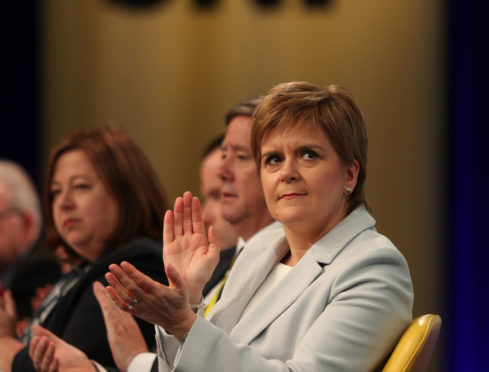
SNP members defied the party leadership yesterday to fast-track the setting up of a new currency in an independent Scotland.
Senior party figures, including Nicola Sturgeon, wanted Scotland to keep the pound in the years after independence with a more gradual transition to a separate currency.
But delegates at the party’s conference in Edinburgh yesterday backed an amendment to the proposals put forward by the leadership, by 781 for to 729 against.
It called for a new currency agreed by parliament to be introduced as soon as practicable after independence day – rather than aiming to complete preparations for it within the first five years of the parliament.
Party members rejected other amendments which would have scrapped six economic tests to guide when the new currency would be introduced, which some heavily criticised, arguing it would lead to using the pound indefinitely.
The currency issue was blamed by some senior party figures for defeat in the 2014 independence referendum. The party had insisted an independent Scotland would share the pound with the rest of the UK, but Westminster ministers flatly ruled out their plans for a currency union.
The decision at the conference is the first time the SNP has adopted a policy position in favour of establishing a new currency.
It comes just days after Ms Sturgeon announced that she wants a second independence referendum by 2021, if Brexit happens.
The First Minister tweeted afterwards it had been a “great debate” on the economy and currency.
She said: “Amendment urges progress as quickly as practicable, and six tests to ensure solid foundation for decision are endorsed.
“We can move forward now with confidence to make the case for Scotland’s future in Scotland’s hands.”
During the 2014 referendum, the Yes campaign wanted a formal currency union which would have allowed an independent Scotland to use the pound.
But it was a move viewed as disastrous by some when it was opposed by Chancellor George Osborne.
SNP deputy leader Keith Brown, who put forward the argument for the leadership’s position, along with Finance Secretary Derek Mackay, told delegates there had been a strong case for independence in 2014 but “it has to be stronger next time round”.
He said: “We want this party’s policy to be to establish an independent Scottish currency.
“We have to try and realise that ambition with caution and common sense, appealing to as wide an audience as possible.”
However he argued the series of amendments which had been put forward would “carry risks” and “if passed, dilute what is the strongest prospectus for our economic future”.
He added: “We all want independence and we want to have it right now.
“But we have to bring more people with us if we want to move beyond 45%. Going harder and faster in my view would damage that case.”
Dr Timothy Rideout, who proposed the amendment which passed, said the use of Sterling means monetary policy such as interest rates would all be set in London and Scotland “would not have real independence”.
He added: “The only way to decouple is to have your own currency.
“Slightly misquoting Macbeth, if it ‘twere done, then it were best done quickly.”
He also said the six tests from the SNP’s independence economic blueprint are “rubbish”, but party policy holds these must be met before an independent currency is introduced.
Activist Cameron Archibald, who also spoke in favour of the amendment, said: “If we argue that we can’t trust the UK to run Scotland’s affairs, then why would we trust it with hugely important powers over our economy for an unknown amount of time?”
But he added: “A currency on day one is unrealistic. At this stage we can only say as soon after independence as practical and as soon as possible to do so – when parliament is satisfied all preparations are complete.”
Pamela Nash, Scotland in Union chief executive, claimed the SNP’s plan to scrap the pound would put “salaries, mortgages and pensions at risk”.
She said: “This will be deeply unpopular with the overwhelming majority of people in Scotland.”
Scottish Liberal Democrat leader Willie Rennie said there would be a “high price” for Scotland as a result of the SNP policy on currency, which would affect pensions and mortgages.
He added: “Nicola Sturgeon has lost control of her party and will lose the argument on the currency. What a mess.”

Enjoy the convenience of having The Sunday Post delivered as a digital ePaper straight to your smartphone, tablet or computer.
Subscribe for only £5.49 a month and enjoy all the benefits of the printed paper as a digital replica.
Subscribe